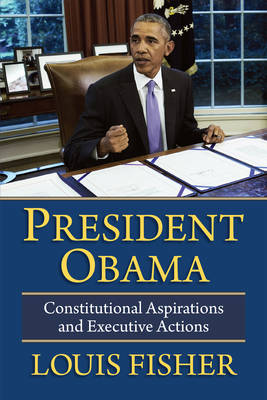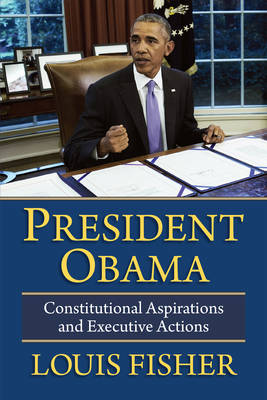
Door een staking bij bpost kan je online bestelling op dit moment iets langer onderweg zijn dan voorzien. Dringend iets nodig? Onze winkels ontvangen jou met open armen!
- Afhalen na 1 uur in een winkel met voorraad
- Gratis thuislevering in België vanaf € 30
- Ruim aanbod met 7 miljoen producten
Door een staking bij bpost kan je online bestelling op dit moment iets langer onderweg zijn dan voorzien. Dringend iets nodig? Onze winkels ontvangen jou met open armen!
- Afhalen na 1 uur in een winkel met voorraad
- Gratis thuislevering in België vanaf € 30
- Ruim aanbod met 7 miljoen producten
Zoeken
€ 33,95
+ 67 punten
Uitvoering
Omschrijving
On the campaign trail, Barack Obama spoke often about his constitutional principles. In particular, he objected to George W. Bush's claim to certain "inherent" presidential powers that could not be checked by Congress or the judiciary. After his inauguration, how did President Obama's constitutional principles fare? That is the question Louis Fisher explores in this book, a disturbing and timely study of the tension between constitutional aspirations and executive actions in the American presidency. A constitutional scholar, Fisher views Obama's two terms within the context of other presidencies, and in light of the principles set forth by the Framers. His work reveals how the basic system of checks and balances has been substantially altered by Supreme Court decisions, military initiatives, and scholarship promoting the power of the president--and by presidents progressively more inclined to wield that power. In this analysis we see the steps by which Obama, himself an expert on the Constitution, came to press his agenda more and more aggressively through executive actions: on climate change, renewable energy, the auto industry bail-out, education initiatives, and financial reform. Rather than focus on policy, Fisher examines the politics and practical concerns that drive executive overreach, as well as the impact of such expanded powers on bipartisan support, public understanding, and finally, the functioning of government. A fair but critical assessment of Obama's executive performance and legacy, this sobering book documents the erosion of constitutional principles that prepared the way for the presidency of Donald Trump.
Specificaties
Betrokkenen
- Auteur(s):
- Uitgeverij:
Inhoud
- Aantal bladzijden:
- 296
- Taal:
- Engels
Eigenschappen
- Productcode (EAN):
- 9780700626854
- Verschijningsdatum:
- 12/07/2018
- Uitvoering:
- Paperback
- Formaat:
- Trade paperback (VS)
- Afmetingen:
- 152 mm x 229 mm
- Gewicht:
- 453 g

Alleen bij Standaard Boekhandel
+ 67 punten op je klantenkaart van Standaard Boekhandel
Beoordelingen
We publiceren alleen reviews die voldoen aan de voorwaarden voor reviews. Bekijk onze voorwaarden voor reviews.











